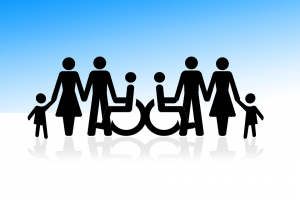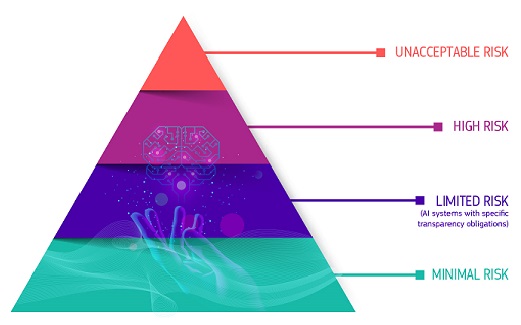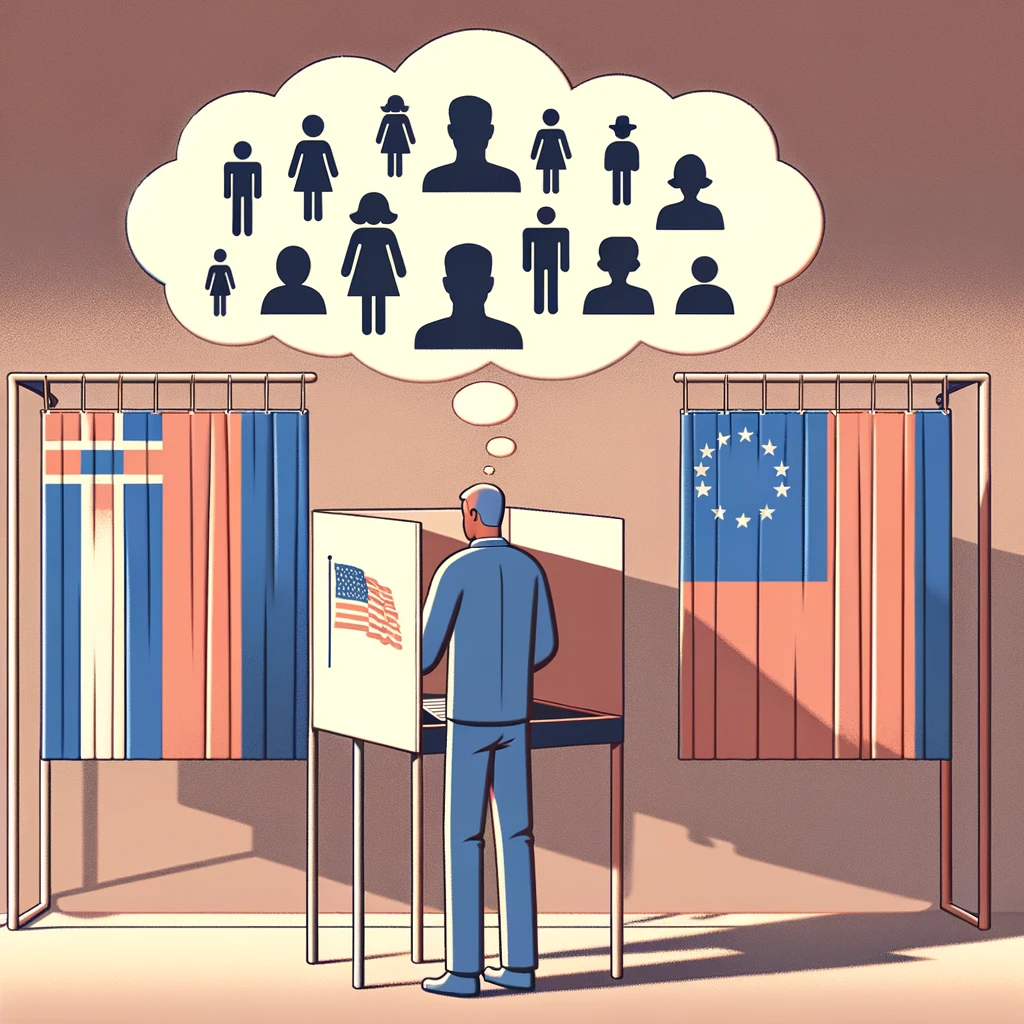 Approximately 44 million Europeans are reported as living with a disability. This can often prevent them from taking a full part in society and economy, whether by way of education, employment and society more generally. These disabilities can take the form of a physical impairment or a mental illness or disorder which hinders basic function.
Approximately 44 million Europeans are reported as living with a disability. This can often prevent them from taking a full part in society and economy, whether by way of education, employment and society more generally. These disabilities can take the form of a physical impairment or a mental illness or disorder which hinders basic function.
It is difficult to live a full and active life when there are barriers to taking part in it. If it is difficult simply to get out of bed and leave the house, if public transport doesn’t make allowance for wheelchairs, or provide information for visually impaired passengers, if the street is crowded and an Anxiety or Autistic Spectrum Disorder renders it intolerable, if the availability of public toilets is something that has to be factored in, or if a person simply can’t face another day in the classroom or office, being treated differently, discriminated against or overlooked.
Compounding these day-to-day difficulties, people living with disabilities also have to endure being spoken for rather than spoken to, or being denied an opportunity to speak for themselves. And while friends and family might provide great support, groups of people living with similar disabilities are invaluable, but often hard to come by.
Social media theoretically provides a panacea to some of these issues, but not by itself. It is not enough to simply give someone a tablet computer and a wifi connection and hope for the best. People living with disabilities are already at higher risk of depression and isolation, and there is a growing link between social media and depression and isolation. They are also less likely to have completed education to a higher secondary level, making them less likely to be equipped to operate safely and productively online.
However, with appropriate media literacy training, delivered either through webcasts, YouTube tutorials, community and social centres and outreach programmes, people living with disabilities can be prepared to make use of social media to enable them to more fully participate in society. Media literacy can even enable people living with disability to work remotely, countering comparatively low levels of employment.
A Social (Support) Network
There are countless pages and groups offering support and solidarity for people living with disabilities on facebook alone, offering support to autistic individuals and their families, for instance. There are more than 100 pages and groups for people living with hearing impairments. There are groups for people living with visual impairments. The communities are as nuanced as any other group of individuals – there is a group for deaf asthmatics to get together and share their experiences, autistic mothers and fathers of teenagers who suffer depression, support groups for carers of children with stomas, as well as countless others.
The value these groups provided to a person living with disability cannot be underestimated. They provide a support network of people with a shared experience, because a good moan in a safe space to someone who just *gets it* is essential from time to time. This opportunity to share the (often) very nuanced issues that they face on a daily basis can be the difference between isolation and community.
They also provide a space for practical help – a group for mothers with ASD has a place to share a text from her sister-in-law asking if “may” meant “might” or “can” in that context. A group for people with colostomy bags in Brussels could help with a request for information about the availability of public conveniences in St Giles, and so on. Information about technology, apps and general hints and tips can be shared, improving the lives of users.
Activism
People living with disabilities may feel they are being spoken at and spoken for. In terms of social and political discourse, well-meaning politicians may not engage enough with communities of people living with disabilities themselves, guessing, rather than asking them what barriers they face, what they would like to see change, raising their issues and promoting their rights from a platform of information and not assumption.
Online campaigns not only raise funding for research, but also enable activism by people living with disabilities themselves. There’s probably a joke to be made about the realities of a rights’ march by people with autism, and yet strides made by the autistic community to challenge the perception of autism in neurotypical culture are already paying off. From the inclusion of autistic people in children’s TV programmes, to public information and awareness campaigns, fundraising for research and support, right through to promoting the rights of autistic people.
Grassroots campaigns start online and become offline marches – wheelchairs regularly roll past the European Commission, placards waving for better support for independent living, to improve disability discrimination legislation, to raise awareness. The chants of deaf men and women for better recognition of sign language can start as words on a screen; a shared experience, an understanding of the difficulties, a movement to overcome them, right through to a change in legislation. This translates to increased visibility and inclusion. There are examples again and again of this phenomena.
On the Level
Social media is a great leveller. You don’t need to leave your house, or even the comfort of your pillow fort, you don’t need to read lips or non-verbal cues to contribute to the great conversation taking place online. In the same way that too much attention is paid to the misogynist behind the safety of his keyboard, and not enough to the feminist behind the safety of hers, too much attention is paid to the dangers of social media and not the opportunities – especially for maligned groups.
Media literacy education for people living with disability provides a safe and effective channel to participate in a full and active life as European citizens. Being accommodated, accepted and welcomed throughout Europe is a journey that can begin behind a keyboard.
 Approximately 44 million Europeans are reported as living with a disability. This can often prevent them from taking a full part in society and economy, whether by way of education, employment and society more generally. These disabilities can take the form of a physical impairment or a mental illness or disorder which hinders basic function.
Approximately 44 million Europeans are reported as living with a disability. This can often prevent them from taking a full part in society and economy, whether by way of education, employment and society more generally. These disabilities can take the form of a physical impairment or a mental illness or disorder which hinders basic function.
It is difficult to live a full and active life when there are barriers to taking part in it. If it is difficult simply to get out of bed and leave the house, if public transport doesn’t make allowance for wheelchairs, or provide information for visually impaired passengers, if the street is crowded and an Anxiety or Autistic Spectrum Disorder renders it intolerable, if the availability of public toilets is something that has to be factored in, or if a person simply can’t face another day in the classroom or office, being treated differently, discriminated against or overlooked.
Compounding these day-to-day difficulties, people living with disabilities also have to endure being spoken for rather than spoken to, or being denied an opportunity to speak for themselves. And while friends and family might provide great support, groups of people living with similar disabilities are invaluable, but often hard to come by.
Social media theoretically provides a panacea to some of these issues, but not by itself. It is not enough to simply give someone a tablet computer and a wifi connection and hope for the best. People living with disabilities are already at higher risk of depression and isolation, and there is a growing link between social media and depression and isolation. They are also less likely to have completed education to a higher secondary level, making them less likely to be equipped to operate safely and productively online.
However, with appropriate media literacy training, delivered either through webcasts, YouTube tutorials, community and social centres and outreach programmes, people living with disabilities can be prepared to make use of social media to enable them to more fully participate in society. Media literacy can even enable people living with disability to work remotely, countering comparatively low levels of employment.
A Social (Support) Network
There are countless pages and groups offering support and solidarity for people living with disabilities on facebook alone, offering support to autistic individuals and their families, for instance. There are more than 100 pages and groups for people living with hearing impairments. There are groups for people living with visual impairments. The communities are as nuanced as any other group of individuals – there is a group for deaf asthmatics to get together and share their experiences, autistic mothers and fathers of teenagers who suffer depression, support groups for carers of children with stomas, as well as countless others.
The value these groups provided to a person living with disability cannot be underestimated. They provide a support network of people with a shared experience, because a good moan in a safe space to someone who just *gets it* is essential from time to time. This opportunity to share the (often) very nuanced issues that they face on a daily basis can be the difference between isolation and community.
They also provide a space for practical help – a group for mothers with ASD has a place to share a text from her sister-in-law asking if “may” meant “might” or “can” in that context. A group for people with colostomy bags in Brussels could help with a request for information about the availability of public conveniences in St Giles, and so on. Information about technology, apps and general hints and tips can be shared, improving the lives of users.
Activism
People living with disabilities may feel they are being spoken at and spoken for. In terms of social and political discourse, well-meaning politicians may not engage enough with communities of people living with disabilities themselves, guessing, rather than asking them what barriers they face, what they would like to see change, raising their issues and promoting their rights from a platform of information and not assumption.
Online campaigns not only raise funding for research, but also enable activism by people living with disabilities themselves. There’s probably a joke to be made about the realities of a rights’ march by people with autism, and yet strides made by the autistic community to challenge the perception of autism in neurotypical culture are already paying off. From the inclusion of autistic people in children’s TV programmes, to public information and awareness campaigns, fundraising for research and support, right through to promoting the rights of autistic people.
Grassroots campaigns start online and become offline marches – wheelchairs regularly roll past the European Commission, placards waving for better support for independent living, to improve disability discrimination legislation, to raise awareness. The chants of deaf men and women for better recognition of sign language can start as words on a screen; a shared experience, an understanding of the difficulties, a movement to overcome them, right through to a change in legislation. This translates to increased visibility and inclusion. There are examples again and again of this phenomena.
On the Level
Social media is a great leveller. You don’t need to leave your house, or even the comfort of your pillow fort, you don’t need to read lips or non-verbal cues to contribute to the great conversation taking place online. In the same way that too much attention is paid to the misogynist behind the safety of his keyboard, and not enough to the feminist behind the safety of hers, too much attention is paid to the dangers of social media and not the opportunities – especially for maligned groups.
Media literacy education for people living with disability provides a safe and effective channel to participate in a full and active life as European citizens. Being accommodated, accepted and welcomed throughout Europe is a journey that can begin behind a keyboard.
 Approximately 44 million Europeans are reported as living with a disability. This can often prevent them from taking a full part in society and economy, whether by way of education, employment and society more generally. These disabilities can take the form of a physical impairment or a mental illness or disorder which hinders basic function.
Approximately 44 million Europeans are reported as living with a disability. This can often prevent them from taking a full part in society and economy, whether by way of education, employment and society more generally. These disabilities can take the form of a physical impairment or a mental illness or disorder which hinders basic function.
It is difficult to live a full and active life when there are barriers to taking part in it. If it is difficult simply to get out of bed and leave the house, if public transport doesn’t make allowance for wheelchairs, or provide information for visually impaired passengers, if the street is crowded and an Anxiety or Autistic Spectrum Disorder renders it intolerable, if the availability of public toilets is something that has to be factored in, or if a person simply can’t face another day in the classroom or office, being treated differently, discriminated against or overlooked.
Compounding these day-to-day difficulties, people living with disabilities also have to endure being spoken for rather than spoken to, or being denied an opportunity to speak for themselves. And while friends and family might provide great support, groups of people living with similar disabilities are invaluable, but often hard to come by.
Social media theoretically provides a panacea to some of these issues, but not by itself. It is not enough to simply give someone a tablet computer and a wifi connection and hope for the best. People living with disabilities are already at higher risk of depression and isolation, and there is a growing link between social media and depression and isolation. They are also less likely to have completed education to a higher secondary level, making them less likely to be equipped to operate safely and productively online.
However, with appropriate media literacy training, delivered either through webcasts, YouTube tutorials, community and social centres and outreach programmes, people living with disabilities can be prepared to make use of social media to enable them to more fully participate in society. Media literacy can even enable people living with disability to work remotely, countering comparatively low levels of employment.
A Social (Support) Network
There are countless pages and groups offering support and solidarity for people living with disabilities on facebook alone, offering support to autistic individuals and their families, for instance. There are more than 100 pages and groups for people living with hearing impairments. There are groups for people living with visual impairments. The communities are as nuanced as any other group of individuals – there is a group for deaf asthmatics to get together and share their experiences, autistic mothers and fathers of teenagers who suffer depression, support groups for carers of children with stomas, as well as countless others.
The value these groups provided to a person living with disability cannot be underestimated. They provide a support network of people with a shared experience, because a good moan in a safe space to someone who just *gets it* is essential from time to time. This opportunity to share the (often) very nuanced issues that they face on a daily basis can be the difference between isolation and community.
They also provide a space for practical help – a group for mothers with ASD has a place to share a text from her sister-in-law asking if “may” meant “might” or “can” in that context. A group for people with colostomy bags in Brussels could help with a request for information about the availability of public conveniences in St Giles, and so on. Information about technology, apps and general hints and tips can be shared, improving the lives of users.
Activism
People living with disabilities may feel they are being spoken at and spoken for. In terms of social and political discourse, well-meaning politicians may not engage enough with communities of people living with disabilities themselves, guessing, rather than asking them what barriers they face, what they would like to see change, raising their issues and promoting their rights from a platform of information and not assumption.
Online campaigns not only raise funding for research, but also enable activism by people living with disabilities themselves. There’s probably a joke to be made about the realities of a rights’ march by people with autism, and yet strides made by the autistic community to challenge the perception of autism in neurotypical culture are already paying off. From the inclusion of autistic people in children’s TV programmes, to public information and awareness campaigns, fundraising for research and support, right through to promoting the rights of autistic people.
Grassroots campaigns start online and become offline marches – wheelchairs regularly roll past the European Commission, placards waving for better support for independent living, to improve disability discrimination legislation, to raise awareness. The chants of deaf men and women for better recognition of sign language can start as words on a screen; a shared experience, an understanding of the difficulties, a movement to overcome them, right through to a change in legislation. This translates to increased visibility and inclusion. There are examples again and again of this phenomena.
On the Level
Social media is a great leveller. You don’t need to leave your house, or even the comfort of your pillow fort, you don’t need to read lips or non-verbal cues to contribute to the great conversation taking place online. In the same way that too much attention is paid to the misogynist behind the safety of his keyboard, and not enough to the feminist behind the safety of hers, too much attention is paid to the dangers of social media and not the opportunities – especially for maligned groups.
Media literacy education for people living with disability provides a safe and effective channel to participate in a full and active life as European citizens. Being accommodated, accepted and welcomed throughout Europe is a journey that can begin behind a keyboard.






















































































































































